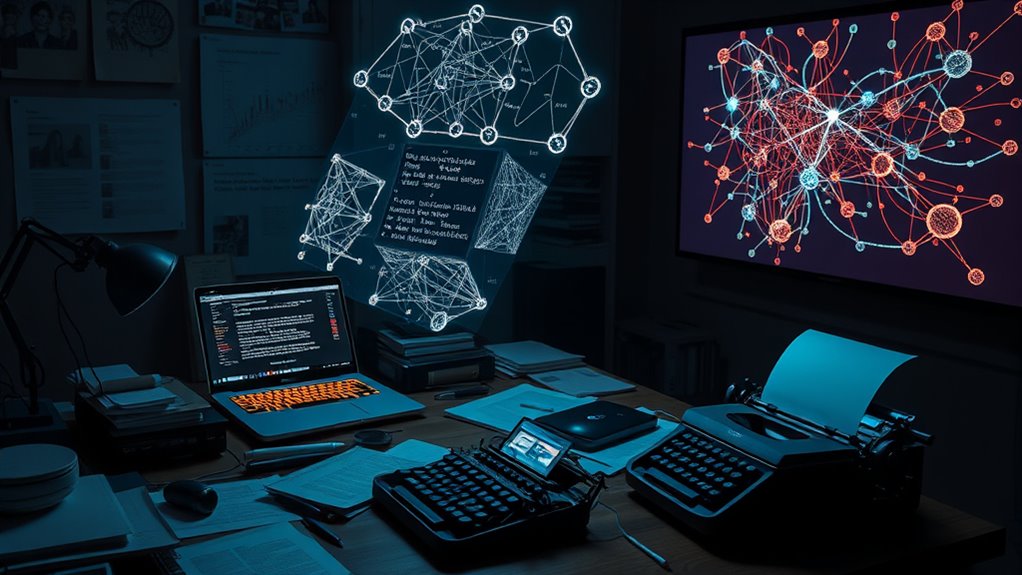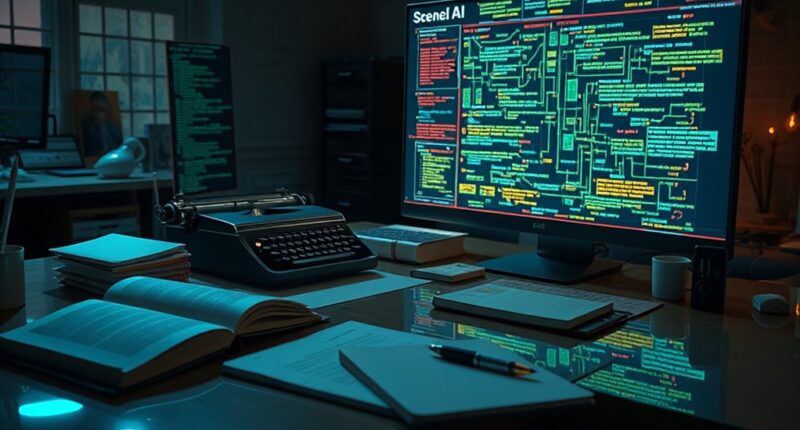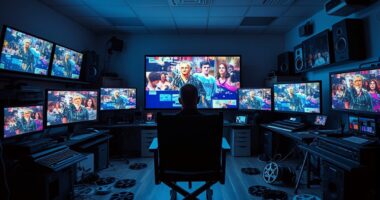AI is revolutionizing screenwriting by streamlining character creation, inspiring innovative storytelling, and enabling more diverse narratives. It helps you craft complex characters quickly and offers new ways to experiment with plot ideas. However, it also raises ethical questions about authentic representation, creative ownership, and bias. By integrating AI thoughtfully, you can enhance your stories while maintaining artistic integrity. If you want to explore how AI continues shaping this field, there’s more to discover ahead.
Key Takeaways
- AI accelerates character creation, enabling faster development of complex, diverse, and layered characters for screenplays.
- It offers innovative storytelling techniques while supporting the development of more inclusive narratives.
- Ethical considerations are vital to ensure authentic, respectful, and stereotype-free character portrayals.
- AI challenges traditional authorship rights, raising questions about ownership, responsibility, and creative control.
- Responsible use of AI fosters a synergy between human creativity and technology, enhancing storytelling quality and integrity.

Artificial intelligence is transforming the landscape of screenwriting, offering new tools that can streamline the creative process and expand storytelling possibilities. One of the most notable innovations is the development of AI-generated characters. These characters can be created rapidly, with detailed backgrounds and personalities, allowing you to experiment with diverse archetypes and story arcs without the time-consuming process of manual writing. AI-generated characters can serve as prototypes or even full-fledged roles, giving you a foundation to build upon or inspiring fresh ideas you might not have considered. This technology enables more dynamic and nuanced character development, as AI can analyze vast amounts of data to suggest traits, dialogue styles, and reactions that resonate with your story’s tone.
AI-generated characters streamline storytelling with rapid creation, detailed backgrounds, and inspiring ideas for diverse, nuanced roles.
However, integrating AI-generated characters into your scripts raises important questions about ethical storytelling. As you rely more on AI, it’s *essential* to *guarantee* that the characters you create remain authentic and respectful of real-world diversity. Ethical storytelling involves being mindful of representation, avoiding stereotypes, and *making certain* that AI tools aren’t perpetuating biases embedded in their training data. You need to actively oversee the outputs, editing and refining AI-generated characters to maintain integrity and authenticity. This balance helps prevent the depersonalization or commodification of characters, *assuring* they serve the narrative rather than just technological novelty.
The use of AI in character creation also challenges traditional notions of authorship. When AI contributes *considerably* to character development, you might question who owns the creative rights or the moral responsibility for the characters’ portrayal. It’s important to establish clear boundaries and ethical guidelines for incorporating AI into your process, protecting both your creative vision and the integrity of your storytelling. As AI tools become more sophisticated, they can help you craft complex characters that are deeply layered, but you must remain vigilant to avoid oversimplification or superficial portrayals.
Ultimately, AI-generated characters are a powerful aid that can inspire innovation and efficiency in your screenwriting. Yet, it’s *vital* to approach this technology with a critical eye, *making sure* your stories remain ethically grounded. By thoughtfully integrating AI and maintaining a focus on responsible storytelling, you can harness its potential to create compelling, diverse, and authentic characters that elevate your narrative. This synergy between human creativity and artificial intelligence can lead to richer, more inclusive storytelling that resonates with audiences while respecting the ethical standards of the craft.
Frequently Asked Questions
Can AI Replace Human Screenwriters Entirely?
AI can’t fully replace human screenwriters because of AI bias and the need for creative authenticity. While AI can generate ideas and draft scripts, it struggles to capture genuine emotion and nuanced storytelling that humans excel at. Your unique experiences and perspectives bring depth that AI can’t replicate. So, instead of replacing, AI serves as a tool to enhance your creativity, ensuring your authentic voice remains at the heart of every screenplay.
How Does AI Influence Creative Storytelling Processes?
Imagine AI as a river carving new paths through a canyon, shaping your storytelling landscape. It influences your creative process by fueling storytelling innovation and expanding narrative diversity, offering fresh ideas and perspectives. You can harness AI’s flow to explore uncharted themes, enhance character development, and experiment with structure. While it guides, it doesn’t replace your voice, empowering you to craft richer, more diverse stories that resonate deeply with audiences.
What Ethical Concerns Arise From Ai-Generated Scripts?
You might worry about ethical concerns like copyright issues and authenticity when AI generates scripts. AI could unintentionally plagiarize or produce work that infringes on existing copyrights, risking legal trouble. Plus, authenticity issues may arise if audiences question whether the story is genuinely creative or just machine-produced. It’s vital to establish clear guidelines to guarantee fair use and maintain genuine artistic integrity in AI-assisted screenwriting.
Will AI Reduce Opportunities for New Writers?
AI may reduce opportunities for new writers by increasing industry job displacement and raising AI skill requirements. As automation takes over routine tasks, the industry favors those who master AI tools, leaving aspiring writers behind. You might find fewer entry-level roles, making it harder to break in. To stay competitive, you need to develop both your storytelling talents and your understanding of AI, blending creativity with technology to carve your path.
How Do Studios Evaluate Ai-Written Screenplays?
Studios evaluate AI-written screenplays by analyzing their algorithmic creativity and conducting thorough narrative analysis. They look for coherence, emotional depth, and originality, comparing AI outputs to human scripts. You’re likely to see them assess how well the AI captures character development and storytelling arcs. If the screenplay demonstrates strong narrative flow and innovative ideas through these evaluations, studios might consider it a viable option for development and production.
Conclusion
As you embrace AI’s role in screenwriting, remember it’s here to enhance your creativity, not replace it. Surprisingly, a recent survey found that 65% of writers believe AI tools help them craft better stories faster. So, by integrating AI into your process, you can unleash new ideas and streamline your workflow. Embrace the technology, stay creative, and watch your storytelling reach new heights—AI is your partner in shaping the future of screenwriting.









